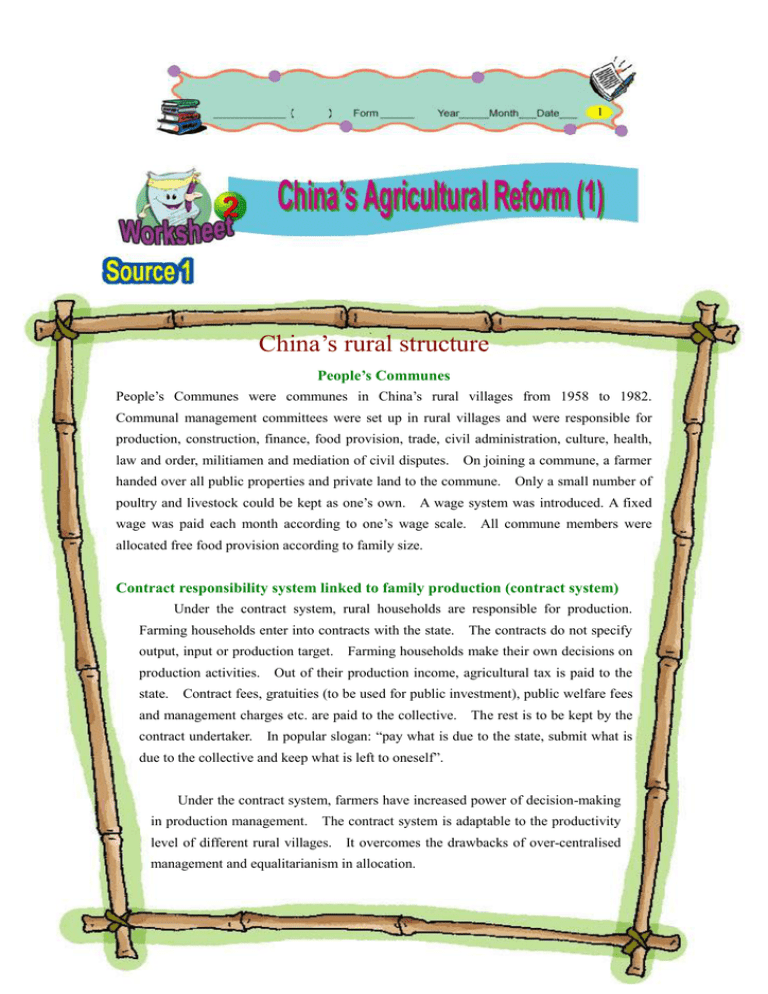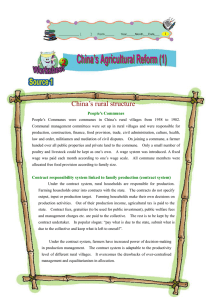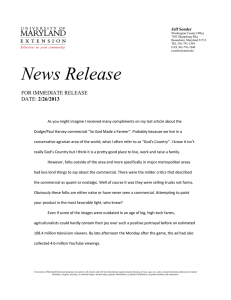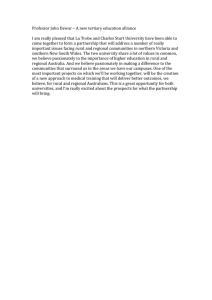chinaopeningup 02 T
advertisement

1 China’s rural structure People’s Communes People’s Communes were communes in China’s rural villages from 1958 to 1982. Communal management committees were set up in rural villages and were responsible for production, construction, finance, food provision, trade, civil administration, culture, health, law and order, militiamen and mediation of civil disputes. On joining a commune, a farmer handed over all public properties and private land to the commune. Only a small number of poultry and livestock could be kept as one’s own. A wage system was introduced. A fixed wage was paid each month according to one’s wage scale. All commune members were allocated free food provision according to family size. Contract responsibility system linked to family production (contract system) Under the contract system, rural households are responsible for production. Farming households enter into contracts with the state. The contracts do not specify output, input or production target. Farming households make their own decisions on production activities. Out of their production income, agricultural tax is paid to the state. Contract fees, gratuities (to be used for public investment), public welfare fees and management charges etc. are paid to the collective. The rest is to be kept by the contract undertaker. In popular slogan: “pay what is due to the state, submit what is due to the collective and keep what is left to oneself”. Under the contract system, farmers have increased power of decision-making in production management. The contract system is adaptable to the productivity level of different rural villages. It overcomes the drawbacks of over-centralised management and equalitarianism in allocation. 2 If you were a Chinese farmer … 1. Of the two systems mentioned above, which one gives you more incentive in farming? Why? Answer for reference: Contract system. Under the system of communes, all output is equally shared within the collective. My personal gain is not directly related to my efforts. Under the contract system, if production exceeds contractual estimate, I will be free to dispose of the surplus and it becomes extra income for me. 2. Which of the above two systems gives more stability to your life? (No definite answer.) Answer for reference: Commune system. Irrespective of the harvest, I will be given the allocated provision. OR Contract system. Hardworking farmers get higher income. Why? 3 By the end of 1994, 98% of rural village groups throughout China practiced family contract management. The area under cultivation covered by family contract management was 93.3% of the total. As such, the mechanism of family contracts has become the most basic form of agricultural production in rural villages. With reform and continuous development of agricultural production and of the rural economy, the income level of farmers escalated greatly. In 1978, the per capita net income of farmers was 133.6 yuan. By 1998, it increased to 2,162 yuan. Rural reform brought growth in production and improvement in food supply. The urban and rural population became better off. Between 1998 and 1978, food consumption expenditure doubled. For example, oil consumption rose 2.1 times, meat 1.3 times, poultry and egg 4.1 times and aquatic products 3.4 times. Other living expenses also grew at great speed. On average, every 100 rural households owned 96.16 TV sets, representing a growth rate of 7.2 times compared to 1985. They owned 32 recording machines and 21.9 washing machines, representing a growth of 6.5 and 11 times respectively as compared to 1985. Electric refrigerators, tape recorders, cameras, air conditioners etc. have become part of ordinary household features. Reference: 4 Assuming you were born into a Chinese farming family, with the implementation of the contract system, you family was allocated a small area of land for cultivation, but it was not big enough to support the family and give every member work. your family sold the surplus food and had some cash in hand. You have learned of the fast development in coastal cities and the large demand for workers for their labour intensive industries. 3. Having considered the above factors, what would you be thinking? Answer for reference: I would use the cash in hand as traveling expenses to go to coastal cities and look for work. 4. If a large number of farmers in China makes the same kind of decision as you do at the same time, what kind of problems will arise? (Students are free to give their answers.) Answer for reference: The surplus labour of the contract system is attracted to coastal areas, resulting in a “flood of labourers looking for work”. The large number of labourers from inland provinces creates pressure on coastal cities. 5 5. From what people say, you can tell who they are. Fill in the blanks on the right with suitable letters. A. Farmers of People’s Communes a. b. c. B. Farmers under the contract system C. Labourers at work What is the use of working hard? In the end, we all eat from the big bowl. The land belongs to the state. Farm produce belongs to the state. I just work for the state. Profit or no profit. Not my business. A After turning over the required quantity of farm produce to the state each year, the rest can be sold on the free market. In this way, I earn more. The harder I work, the more the rewards. B I work in a factory in Pudong. I did not go home for the Spring Festival because work was demanding in the factory, and it was C difficult to purchase train tickets. d. In the past, everything was planned by the commune. Work done for irrigation was counted as workpoints. Nowadays, I grow corn. The harvest is not bad, but I have no time to do irrigation work. In any case, major irrigation projects cannot be achieved by us mere farmers. And yet, if you don’t care and I don’t care, we will be the ones to suffer in the end. B




